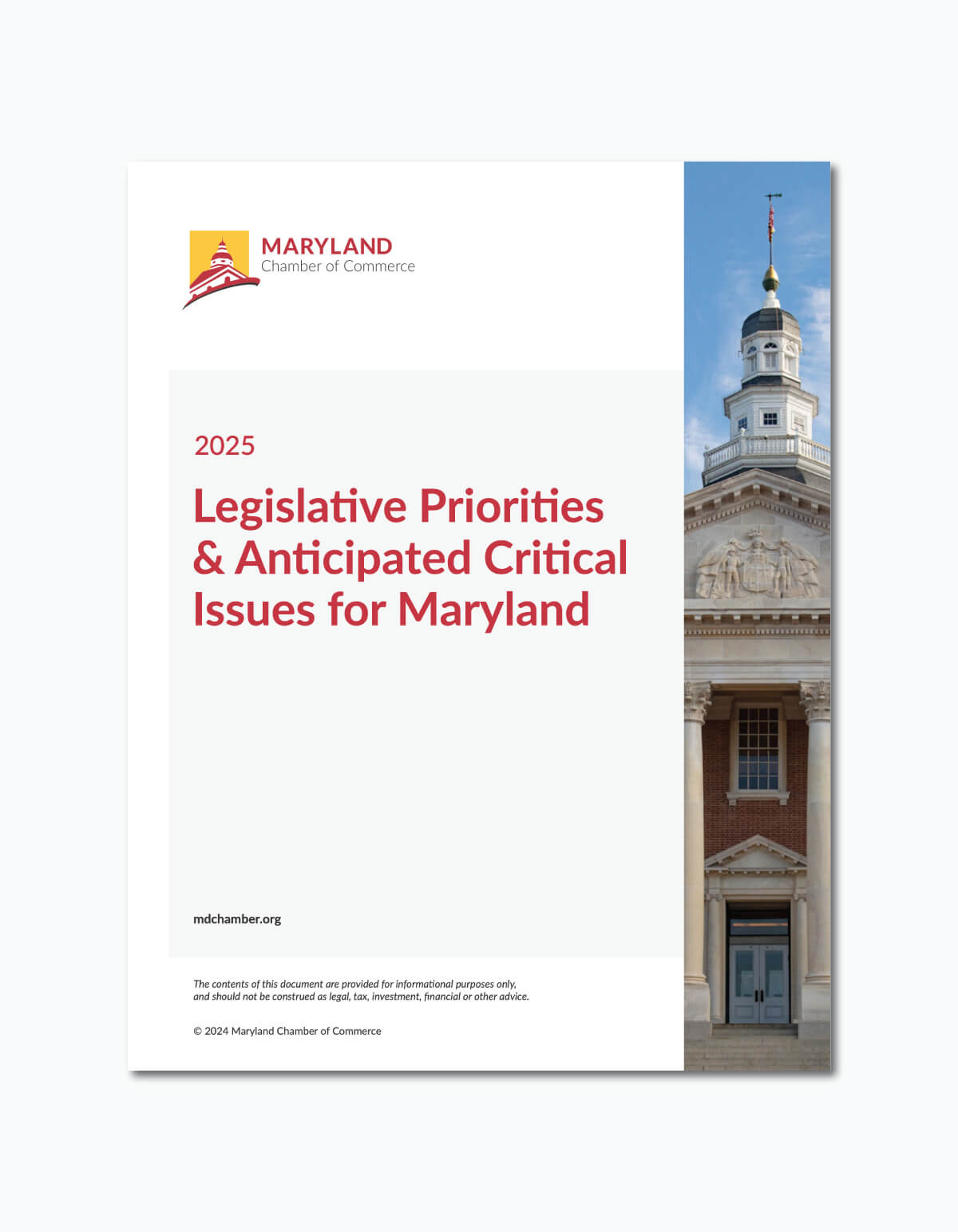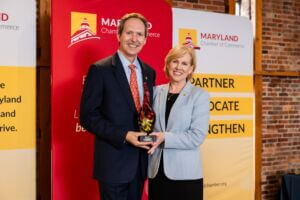ADVOCACY
2025 Legislative Priorities & Anticipated Critical Issues
Dec 2, 2024
Maryland’s greatest asset isn’t just its strategic location or talented workforce — it’s the bold, innovative spirit of our businesses that truly define our state. As we head into a challenging legislative session, the Maryland Chamber of Commerce will stand as the leading advocate for business, working to shape pro-growth policies that ensure our communities continue to thrive together. But to succeed, we need your engagement and support.
Our 2025 Legislative Priorities and Anticipated Critical Issues for Maryland will serve as our roadmap for the session ahead — and it’s yours, too. Together, we can advocate for these priorities and create the foundation for a stronger economy and a brighter future for Maryland.
Our top priorities for the 2025 Legislative Session include:
- Business Taxes — As Maryland addresses future multibillion-dollar budget deficits, the Maryland Chamber of Commerce stands ready to work with the legislature and administration towards a solution that prioritizes responsible government spending, includes targeted cuts that maintain key government programs, and avoids new cost burdens on businesses that reduce economic opportunities for all Marylanders. It is essential to focus on strategies that promote economic growth and expand the tax base, ensuring a sustainable revenue stream that supports vital public services without placing undue burdens on businesses. We urge Governor Moore and the General Assembly to develop well-balanced fiscal strategies that promote economic stability and foster job creation without disproportionately impacting Maryland’s business community. Policymakers must carefully consider the trade-off between generating new revenue and maintaining and enhancing Maryland’s economic competitiveness.
- Transportation Funding Solutions — As Maryland continues to incentivize electric vehicle adoption and the use of fuel-efficient vehicles grows, it is imperative the General Assembly take steps to address the sustainability of the Transportation Trust Fund (TTF) and its reliance on the gas tax as a key funding source. The TTF serves as Maryland’s primary source of funding for infrastructure and transportation needs. Enhanced and sustainable funding solutions are necessary for Maryland’s economy and the safe and efficient movement of people and goods. We look forward to being a collaborative partner in discussions with the legislature and administration to identify solutions that secure Maryland’s transportation future.
- Data Privacy & AI — We support the development of a regulatory framework that addresses both data privacy and artificial intelligence in a manner that balances innovation with consumer protection. Maryland’s current data privacy law, passed in 2024, contains inconsistencies and compliance challenges compared to other states. It is crucial to address these issues before the law takes effect in July 2025 to provide businesses with clarity and reduce the burden of navigating a patchwork of regulations. Additionally, as AI continues to evolve, policymakers and business leaders must collaborate to ensure a flexible and balanced regulatory approach that fosters innovation while safeguarding privacy, ensuring ethical use, and maintaining fair competition. This will allow Maryland businesses to harness the potential of AI without compromising consumer trust or market integrity.
- Climate Tax Policies — The Maryland Chamber advocates for a balanced approach to achieving the state’s climate goals that fosters economic growth. As Maryland strives to meet the ambitious goals established under the Climate Solutions Now Act, it is imperative that we pursue strategies that do not impose undue financial burdens on our businesses and consumers. Proposed measures to raise revenue to pay for climate mitigation threaten to introduce over $1 billion in additional taxes annually, undermining the economic stability of the state during a time of growing budget deficits and slow growth. We urge policymakers to prioritize cost-effective solutions that enhance grid reliability, facilitate the development of a diversified and inclusive energy portfolio, and support innovation. Ultimately, a sustainable and equitable transition to renewable energy can be achieved without sacrificing the competitiveness of Maryland’s business community and economy.
- Increasing Child Care Availability — We have supported legislation and budget initiatives in the past several sessions aimed at incentivizing the opening of new childcare facilities and the expansion of existing ones. The cost and availability of childcare remains a contributing factor to Marylander’s decisions to return to the workforce. Addressing Maryland’s workforce shortage must be a priority issue for the Governor and the General Assembly. In fact, according to data from the U.S. Chamber of Commerce, Maryland only has 33 workers for every 100 jobs in the state, ranking Maryland as the third most severe worker shortage index in the country. As such, we will continue to support legislative and budget initiatives in the 2025 session to expand and support childcare facilities, allowing Marylanders to get back to work and addressing a critical piece of the broader workforce shortage.
Stay informed this session. Read our full 2025 Legislative Priorities and Anticipated Critical Issues report, subscribe to our action alerts and learn how you can get involved.
With thousands of bills each session, it's impossible to track every piece of legislation impacting business. The Maryland Chamber's exclusive Bill Tracker provides members concise summaries of relevant bills. We analyze each bill, take a position, and provide information to help members understand potential impact.
Access the 2025 Legislative Session Bill Tracker — Available exclusively to members.



Why Businesses Like Yours Trust Us to Deliver Results